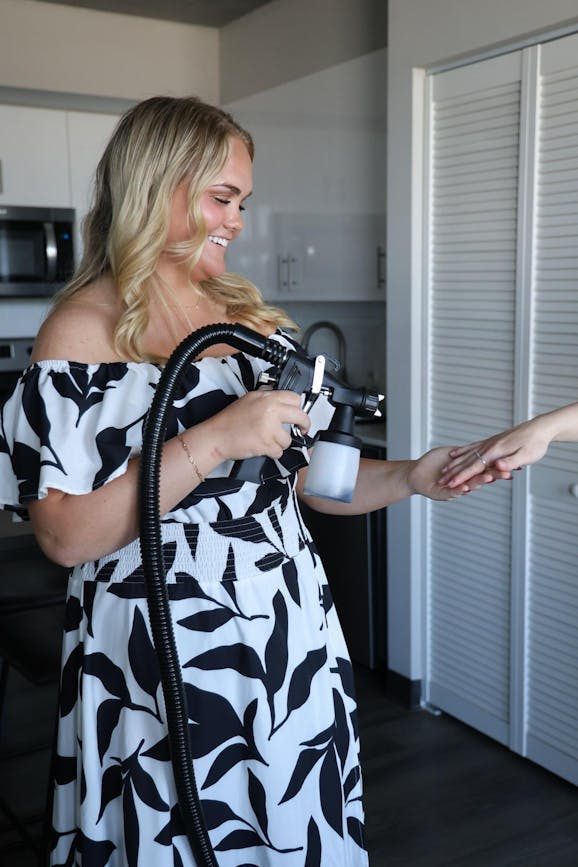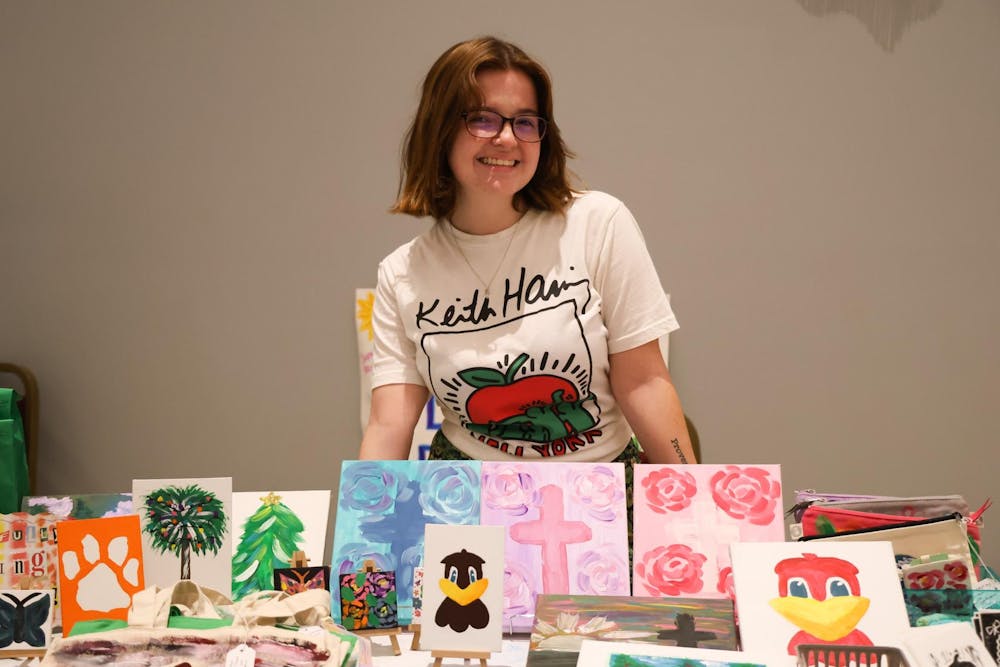It's a Tuesday on campus, and Thomas Cooper Library is bustling with students arduously knocking out work for the week. One student finishes her assignments, but instead of going home, she drives to an apartment – not one belonging to a friend or a classmate, but a client's. Another heads straight to her studio to paint a new canvas.
As a college student, managing school alongside with expenses such as housing, food and transportation can be complicated. On-campus jobs are coveted and hard to come by. However, a growing number of students are finding ways around these barriers by using their creative passions to start businesses, all while grappling with time management.
Less than a year ago, junior exercise science major Laney Hicks started her small-business journey. Hicks gained experience in self-tanning through her years in competitive dance, where the practice is common. Her fellow dancers, friends and family members told her she had a talent for flawless self-tanning and began requesting her services themselves. Then, her college roommates began asking her too. Recognizing her expertise, they encouraged her to start a business in spray-tanning. Hicks was hesitant in the beginning, unsure if she would have time for it.

“I just don’t know if I have the time for it. And then, this past Christmas, my grandma actually got me the spray tanning kit,” Hicks said. “Now I love doing them. Everyone gives me great compliments on them, so it makes me feel good.”
After Christmas, she started off providing her services to dancers at her former studio and to college students getting ready for formal events, which has since expanded into offering tans before dance competitions and USC sporting events.
With a growing number of clients since her business started, Hicks now has more responsibilities. These include advertising her business, transportation to and from clients and finding time for her services during particularly load-heavy school weeks. Despite these, she has created a balance that works for her – relying on help from her friends, utilizing social media and building her booking schedule around school responsibilities has allowed managing a business to fit into her life. Hicks advertises her work on platforms such as Snapchat and her business Instagram under the handle @tansbylaney, while her friends and regular clients spread her business by word-of-mouth.
Hicks would manage her schedule depending on how many tanning appointments she would have weekly.
“If I knew I had a lot, I would prioritize schoolwork in the morning throughout the day, get whatever assignments I had done because they usually don’t come until night," she said.
With a difficult curriculum comes new challenges. For college students nearing the end of a semester, burnout becomes increasingly common, especially for students with extracurricular engagements. Rather than work inspiring additional stress, she finds comfort in running her business during these times.
“I think, honestly, it makes my mental health better. I get excited to do people’s spray tans,” said Hicks. “It just makes me feel better.”
Junior Sofia Harsey, an art history major who began selling her art in September 2024 also finds meaning in running a small business. Across many social media platforms, she documents her work and the process behind it, typically under the handle @faithfully__living. She has an impressive range of wares, including but not limited to handwoven baskets, acrylic paintings, and even tote bags adorned with Cocky’s likeness. She often sells her work at craft fairs for local churches and street events. For Harsey, art is not simply transactionally motivated. She paints what she feels like painting and hopes others will follow suit.

“I don’t want to make something just because I think someone else will like it. I’d rather make art that I truly enjoy doing,” she admitted. “I definitely lean more toward what I do like and then hope that other people will like it as well.”
However, Harsey’s passion for art and her subsequent business make for a busy schedule during the semester. While the exact amount of time per week that she spends on her business varies, the hours she works generally range from 10 to 20 depending on events and commissions. As for schoolwork, Harsey typically works upwards of 15 or 20 hours. To balance both of these pursuits as equally as she can, she has a specific schedule in place.
While Hicks divides her responsibilities on a daily basis, Harsey halves her commitments during the week.
“I try to do most of my schoolwork at the beginning of the school week – Monday, Tuesday and Wednesday,” said Harsey, who dedicates the rest of the week to creating.
As her own boss, she keeps a dedicated itinerary to stay on track with her commitments. But as art is often time-consuming - let alone producing multiple projects for others - burnout can become a significant issue.

“I definitely do experience burnout like everybody, especially during midterm week and finals week,” said Harsey. During these more intense periods, Harsey prioritizes her schoolwork to preserve her mental health.
Like Hicks, Harsey reiterated that while sometimes challenging, turning her passion into a source of income has been a rewarding experience.
Both students say they've loved their journeys and hope to continue their thriving businesses after they graduate. For any student looking to potentially start their own business, Hicks and Harsey advised them to go for it.
“Just try it and get out there,” said Hicks, who added that starting off slow and having a support system is crucial to building confidence as a business owner.
Harsey emphasized that placing trust in yourself is the most effective path to success.
“I think that as long as you believe in yourself and you surround yourself with people who believe in you, you can accomplish anything,” said Harsey.



